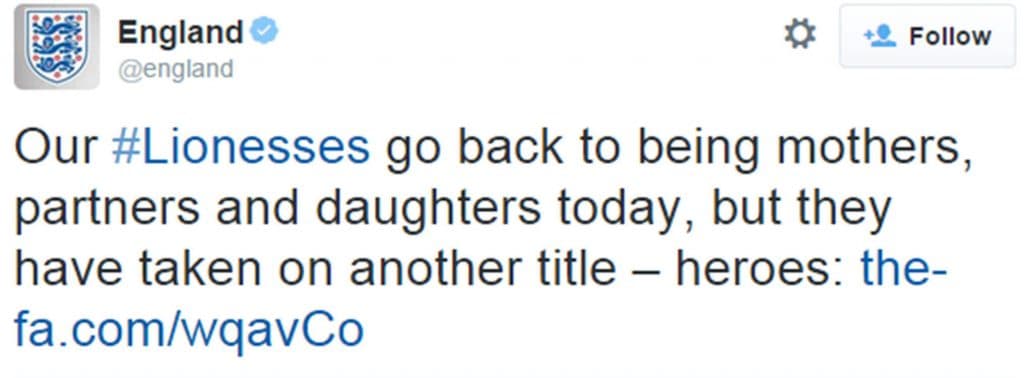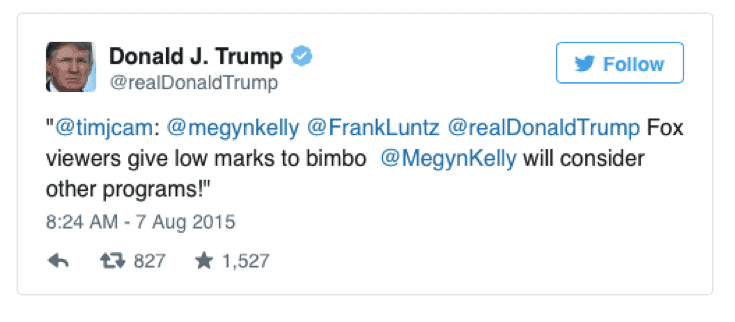Why are we scared of the ‘F’ word?
Global Pop Icon. Veteran Golf Commentator. Presidential Candidate. Sports Governing Body.
And they’re all bothered by the ‘F’ word.
Taylor Swift. Peter Alliss. Donald Trump. The FA. All creating comment and filling column inches regarding their stance on Feminism.
This trend on what’s Twitter trending concerns me.
But let’s go back to the start. The BBC was forced to issue a public apology after the Open Golf tournament when their commentator, Peter Allis, suggested that Kim Barclay, Zach Johnson’s wife, was contemplating a new kitchen as Johnson prepared to take his title-winning putt.
After the Lionesses’ bronze medal win at the Women’s Football World Cup, the FA had to delete their homecoming tweet:

But with 1.2M followers the tweet was mentioned over 1,000 times in an hour – many imagining whether an equivalent ‘fathers, partners and sons’ tweets would ever be sent.
But such twitterstorms are nothing in comparison to the ongoing furore surrounding Donald Trump’s spat with journalist Megyn Kelly, a moderator of Fox’s Republican Presidential candidates’ debate. As an example of his twitter invective:

So, what’s going on? We have “casual” sexism from a BBC sports commentator, and then the 150+ year old FA, both managing to detract from inspirational achievements on the field of play. But surely we expect “casual” equality from both institutions? And then we have misogynistic comments from a wannabe US President who’s leading in the early polls for the Republican Party nomination. So, in this confusing landscape, who steps forward?
Taylor Swift. Our feminist spokeswoman arrives without any diffidence in using the “F” word. Ms Swift embraces the word and calls her fellow female icons on stage alongside her throughout her global tour creating a stream of positivity and collaborations. I have heard so many female pop stars say, “Well, I wouldn’t call myself a feminist….”. In fact, I’m hard-pressed to think of any contemporary icon who embraces the word, except Taylor Swift. Therefore her opinions on equality and fairness are as refreshing as the infectious rhythms of her music. She boycotted both Spotify in 2012 and now Apple iTunes’ 30-day free trial streaming service because artists were not being justly compensated. Not many people receive a public apology from veteran firebrand Billy Bragg, but even he kowtowed to Taylor Swift on this subject.
The beautifully outspoken writer and comedienne Caitlin Moran, another who is quick and proud to call herself a feminist, argues that we need to reclaim the “F Word” and laugh off any perceived negative connotations. In her own words:
“When statistics come in saying that only 29% of American women would describe themselves as feminist – and only 42% of British women – I used to think, What do you think feminism IS, ladies? What part of ‘liberation for women’ is not for you?”
According to the Webster dictionary feminism is defined as “the belief that men and women should have equal rights and opportunities.” So why do so many see feminism as a negative badge? If we are pro-equality, shouldn’t we be proud to call ourselves feminist? And I’m talking about men and women.
Self-proclaimed “feminists” in business are harder to find. If men and women wore feminism like a badge of honour in the workplace, might we have more chance of addressing the gender imbalance in the boardroom? Because that’s not happening in a hurry is it? One research study after another demonstrates that business performance increases when more women are recruited into senior positions:
- “In a study of the Fortune 500, Catalyst reveals that companies with the highest percentile of women on their boards outperformed those in the lowest percentile by 53% higher return on equity, 42% higher return on sales, and 66% higher return on invested capital” (Opportunity Now)
In a time of falling productivity and employee engagement challenges, we need high-ranking women in the workplace more than ever to provide a balance of expertise and perspective. It’s an absolute no-brainer. Despite more high-ranking female executive appointments than in previous decades, the statistics couldn’t be more telling:
- In the UK, only 9.8% of FTSE 250 companies are led by women, and 44% have no female board members at all. Former Trade Minister, Lord Davies, estimated that, at the current rate of change, it will take 70 years to achieve gender balance in the boardroom.
- In the US, 93% of CEOs of Fortune 250 companies are men.
If around 80% of buying decisions are made by women, then why are the majority of businesses selling those products led by men? Isn’t it time for the workplace to mirror an organisation’s consumer base? An organisation’s efficacy is enhanced when the diversity of its consumers is reflected by the diversity of that organisation.
Organisations are eager to promote the label of “diversity in the workplace”. Whether it relates to ethnicity, age, (dis)ability or gender, we’d all be happy to argue that everyone deserves an equal chance to succeed at work. Employers know that they’re enhancing their employer brand by shouting about diversity. You only have to look at this video by Deloitte to see what I’m talking about. But even amongst all those corporate web pages shouting about diversity and inclusion, I haven’t seen the F word. Not once. Why is that?
But what if companies, large influential companies, started to call themselves feminist in their values and practices, and started to measure and champion the F word in their workplaces? Might it not show that they really care about getting women to top positions, and that they will address the ongoing pay imbalance between the sexes? Might it not even give them a competitive edge when recruiting and retaining top talent – the top talent which drives success, mirrors their consumers and creates feminist role models beyond those on concert stages?
It’s the 21st century. Is stating we’re a feminist in the media, in sport, in politics, or in business really that scary? I’m a feminist. Are you?
© Tim Pointer, Starboard Thinking 2015
Tim Pointer has over 20 years’ leadership experience, directing business transformation in global organisations with an award-winning approach. His consultancy, Starboard, is working with clients across a wide range of sectors on accelerating organisational performance through leadership, engagement and culture.
Photo by enginakyurt on Unsplash

